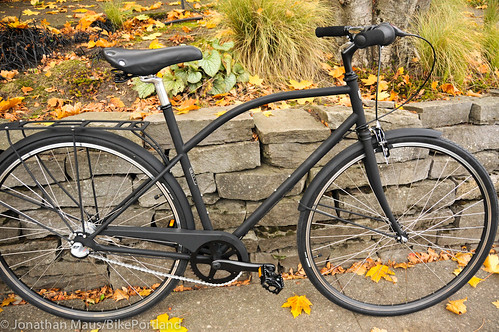
(Photos © J. Maus/BikePortland)
A new bike company based in Detroit says they’ve cracked one of the toughest nuts in the bicycle industry: A full-fledged city bike made in the USA that retails for just $550. The “A-Type” from Detroit Bikes is made in the company’s 50,000 square foot factory and it’s about to invade Portland. With a free concert and launch party set for Saturday night, and a local dealer already set up to sell them, I figured it was time to give these bikes a closer look.
WTF Bikes owner Tom Daly couldn’t be more excited about the A-Type. Daly’s shop on SE Milwaukie (just south of Powell) has been chosen by Detroit Bikes as the sole Portland dealer (for now). He was busy getting a few of them built up for Saturday’s event when I stopped into see him yesterday. “I am so happy that it’s an American-made bike with the price point it has,” he said. “When I first saw the bike I though, ‘Oh, that’s cute,’ then I realized it was made in Detroit and I was like, ‘No way!'”
Daly said he didn’t curse the company’s name once while he put together his first A-Type. “And from a mechanic’s standpoint,” he said, “that’s really good.” The only minor complaint Daly mentioned about the bikes is that, while the build is solid, the frame welds aren’t exactly what you’d call “artisan.” But that’s fine with Daly, he appreciates the fact that the frames have a lifetime warranty and the company pays union welders a fair and livable wage.
Like the Ford Model T (which the company seems to take its marketing cues from), the A-Type comes in only one color (matte black), one size (fits people about 5′ 7″ 5′ 5″ to 6′ 2″), and one style. That no-extras approach helps them keep production costs down and pump out an impressive volume of bikes.
Here are a few more shots of it…
Detroit Bikes owner and president Zak Pashak says they have the capacity to produce 40,000 bikes per year. “American bicycle manufacturing hasn’t seen this type of mass production start-up in generations,” Pashak said in a statement. The company is proud of the fact that they are, “introducing the return of high-volume US bike frame manufacturing.”
The bike itself rides nicer than I expected. It’s stiff and solid, yet still has a bit of spirit when you really step on the pedals. It comes with a Shimano three-speed, rear coaster brake and front hand-brake as well as fenders, a chainguard, a rear rack, and other nice little touches.
Will Detroit Bikes become the next Schwinn? Will U.S. customers spend $550 on a no-nonsense city bike built to get you from point-A to point-B without making a big statement? We’ll have to wait and see; but the presence of these on the market is a hopeful sign for bicycling and for manufacturing in America.
If you want to know more, show up at Bunk Bar (1028 SE Water Ave) at 9:00 pm tomorrow night. The bikes will be on display and there will also be a performance by punk band White Lung. You can also stop by WTF Bikes at 3117 SE Milwaukie Ave and Tom will happily let you take one for a spin.



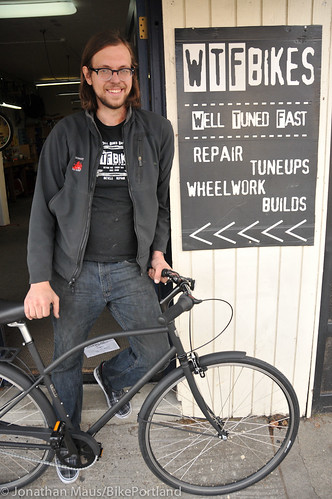
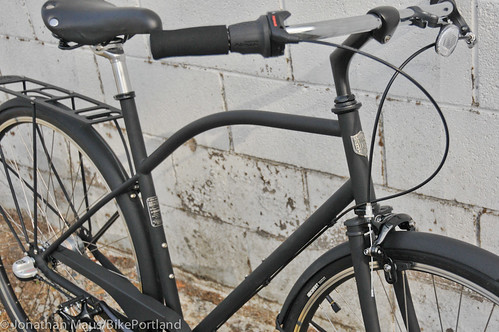
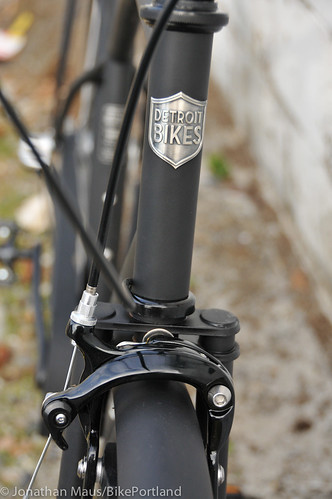
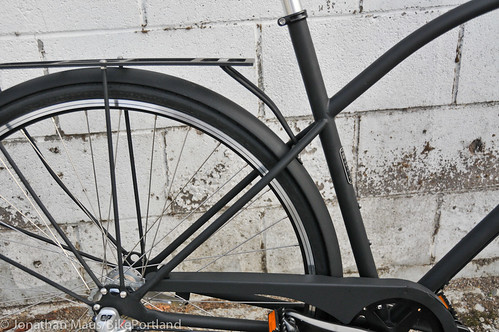
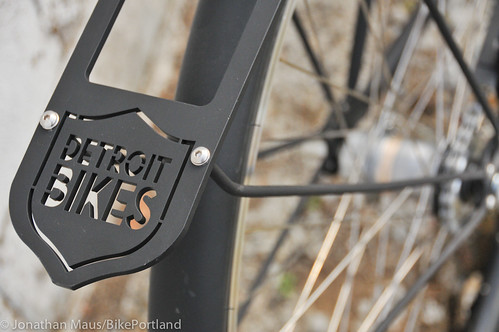
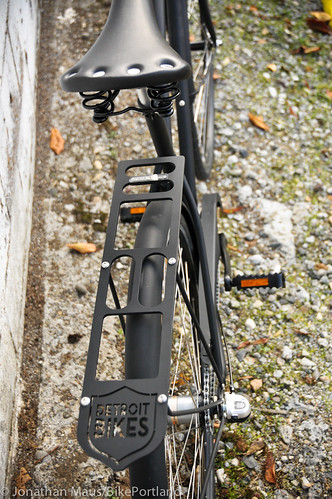
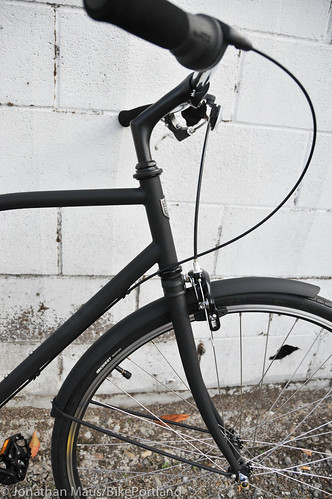
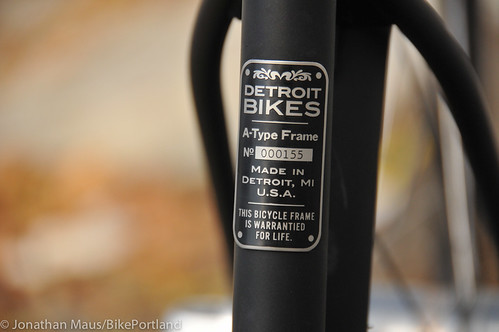
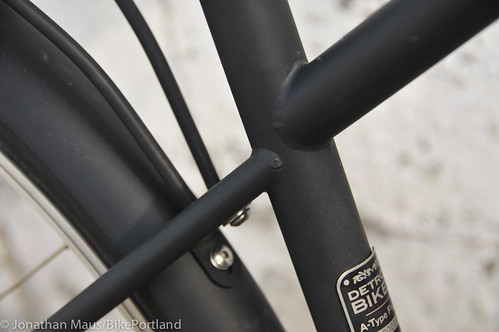
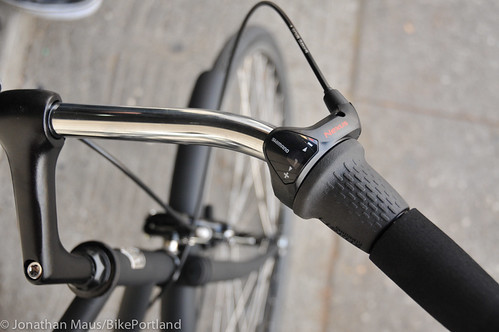
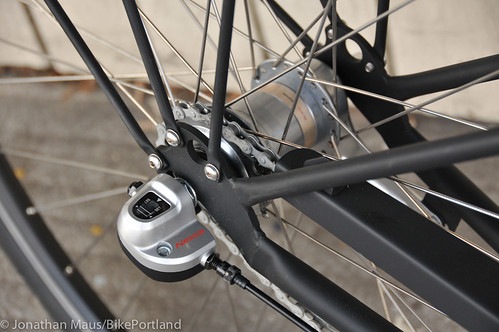
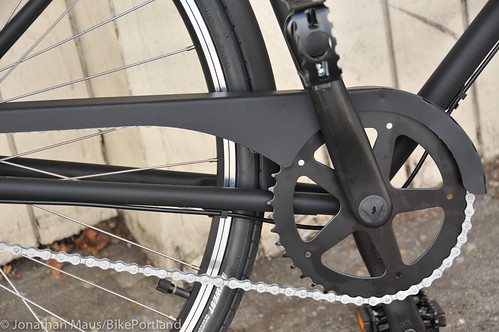



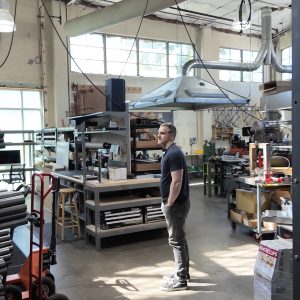
Thanks for reading.
BikePortland has served this community with independent community journalism since 2005. We rely on subscriptions from readers like you to survive. Your financial support is vital in keeping this valuable resource alive and well.
Please subscribe today to strengthen and expand our work.
I like Detroit and inexpensive things. I’ll have to try it.
Cool. Stoked. But…5’7″ to 6’2″….so hopefully they will come out with an equally priced one that will fit most women at some point not just the high end of the bell curve. Average US women is 5’4″! I might be lucky to fit the bike at 5’6″.
kj…I feel ya! I was thinking the same. I too, am 5’6″. I figure that my long limbs will enable me to ride this model with ease and comfort.
-Heather
to clarify, this is a bike I would want to buy! I think it’s rad. And though I am with great weryness, not surprised at the sizing…I am tired of coming in second in the marked for anything since things are made for default male sizes.
I’m 6’4, so it doesn’t fit me either
Yeah, but they make extra-long seatposts and stems, and on a bike like this that’ll get you close enough. Lowering the top tube is more of a problem.
you could shorten that seat tube…
With a saw?
Worse than that. Looks like dropping the seat all the way to the existing tube is going to leave zero standover.
Snapping a fully extended seat tube off at the safetyline while riding is way worse than not being able fit a particular frame.
About 5% of the US male population is over 6’2″, so you are on the high edge of the bell curve for males. You represent a niche market of tall folks that the rest of us look up to. Average sized women are a much larger potential customer base than unusually tall men.
When news is disappointing for women, as it is here, I don’t understand the motivation behind suggesting that really unusually tall (men?) have it bad too, despite being more likely to be paid well etc. A passive attempt to silence/delegitimize women? I hope not.
And on a style choice too.
Seems they could have run a straight top top tube instead of the curved one to give quite a bit more standover. With the standover. With that a less of an issue stems and seatposts can be used to fit more people.
Seconded. This sizing says to me that they didn’t even think of women riders as a market.
I think they had the ability to produce one bike to start off with, and chose to go for the 5’5 to 6’2 range. I’m sad that it won’t fit me at 6’4. There is a smaller model in the works, that should be out in the spring.
I think for a startup like this they have to pick one size to keep costs down. If it’s successful they will likely expand sizes I’d imagine. Same goes with distribution. I’d whine that they didn’t start in my neighborhood but I realize their logic.
Please note. The manufacturer says the bike fits people 5′ 5″ to 6′ 2″… I put 5′ 7″ initially because I had that in my notes as being what Tom said he recommended. I’ve edited the story. Sorry for any confusion.
They are working on a mixte model, smaller frame bike that is anticipated in the spring. It will be white, and called the B-Type.
One size fits all is not going to work with bikes, and poor marketing to try and trick people into falling for it,
This bike would not work too well as my daily commuter being that I have a pretty significant hill to climb. But, as far as something that I could use to get around the neighborhood and do a bit of shopping and visiting friends? Absolutely.
Gotta love the fact that it already has fenders and a rack!!
I was amazed to see that WTF Bikes is open on days other than Wednesday-Thursday-Friday. Whoda thunk?
We’re open Tues-Sat, 10-6 and Monday by appointment.
Anyone figure out if it’s compatible with an Xtracycle yet?
Seems a little iffy to me — the 3-speed hub and frame could easily be less than 135mm wide (though the frame could be sprung) and the tires (700cx32mm) are not best choice for a FreeRadical. I used tires that skinny for a while, broke a fair number of spokes, damaged a rim, went fat.
Sounds to me like you had some wheel problems. You should easily be able to run 700×32 tires without breaking spokes and damaging your rims (or 28s or 25s or 23s for that matter).
Put 200 pounds of cargo on that wheel, in addition to half of the bike and its 220lb rider, ride it in a Boston suburb locally known for its undermaintained roads. I *rumpled* the rim; bent the metal sidewall, and put it roughly back into shape with vice grips. 32mm tires are not rated for that much weight (e.g., Schwalbe 26″x60mm Big Apple rated for 140kg, Schwalbe 700cx35mm marathon racer rated for 95kg). If I had known then what I know now, I would never have tried it, which is why I don’t think this bike is a good candidate for an xtracycle. I.e., you are talking to someone who has sewed up tubulars in his youth, who has ridden an xtracycle with “skinny” tires, who has ridden an xtracycle with “fat” tires, and who has built some wheels, including one that has done time on the back end of an xtracycle that gets daily use. Do you have that experience?
The spoke breakage was some flaw in the original wheel, but it was not helped by my weight or the loads; the rumpled rim was a wheel hand-built by a reputable builder, and a waste of a good wheel.
Your error was trying this in Boston. I’m a life-long cyclist who has given up riding because the Lesser Boston Area is grimly horrible for cycling. If you don’t vanish down a pothole, you will be killed by the drivers, or simply disappear under a snowdrift. If you want to cycle (and live) don’t reside in Boston.
I dunno, I’m pretty happy with it. Once I fattened the tires, I suddenly didn’t need to care about the terrible roads nearly so much. Adopting a cycling style that might charitably be called “Boston-Effective” helps; if you actually drive or ride like someone who cares about the traffic laws here, you’ll (at best) only piss people off.
Makes me wonder if they’ll make a fat-person bike. I’m fat like the OP and want to feel safe on a bike. There’s an obesity epidemic here, so why not take advantage of this under-served, local market?
Call it “husky” and offer it with tougher tires.
As previously mentioned, Detroit Bikes needs to produce bicycles that will fit shorter riders. Even Henry Ford was eventually convinced, after loosing market share to GM, to give customers the choices that they demanded. I live in Michigan and wish Detroit Bikes the best but they need to produce at least two sizes and either improve the quality or reduce the price of their bikes. Preferably both.
There’s a step-through model in the works. It should be out in the spring.
Good to know!
Felt good to see “Made In USA” like when I bought my first bike as a kid, paying the hardware store small payments until that wonderful day came when I paid it off and could blast around on a brand new American steed with the nubbies still on the tires. Yee-ha.
Great price ($550) for a complete 3-speed bike, considering that the frame (and some other parts?) are made in the USA. Many Chinese-assembled bikes will cost about the same, at a bike shop.
But I don’t like the style of curved top-tube, and the flat rear rack will be hard to use with most panniers.
I also think they need to start with a smaller model, aimed at women. Perhaps they could just flip that curved top tube upside-down to make it a partial step-thru / step-over frame; it would look a little like an old Schwinn.
Linus is selling a ton of 3-speed mixtes and step-thru frames (mostly to women), and they list for $675!
http://www.linusbike.com/models/dutchi-3/
Actually, I”m going to change my impression to “AMAZING price.” The cheapest comparable 3-speed, at a local bike shop, would probably be the KHS Green. It is $440, and the hi-ten steel frame and assembly is done in China. As mentioned, the Linus bikes, also made in China, are hi-ten steel and cost $675.
So this new bike will be only $110 more than the cheapest competitor, but is made of 4130 Chromoly tubing, in the USA, and it’s a cheaper than a similar bike that many people are currently buying.
Look out for the Detroit B-Type, coming out in the spring. It will be a step-through frame and will accommodate shorter riders.
I tend to agree… great price point (for a complete, wholly new bike), but it still can’t beat a solid, well-maintained CL find.
There have been several attempts at this kind of thing lately, but I’m always puzzled by why the frames invariably end up made out of the lamest steel, rife with outdated tech and, as often as not, looking butt-ugly to boot.
As for being the next Schwinn… let’s try to remember: Schwinn went bankrupt and the name was sold to the Chinese. Now they’re made in Guandong.
Are those foam grips?
Foam sucks up a lot of water in the rain.
Grips are very easy to change. If it came down to it, I would happily put a set of rubber grips on the bike.
Five hundred bucks is cheap?! No way am I going to spend $500 for something that will get stolen by the next person with a set of bolt-cutters
Yes, it actually IS cheap. I dare you to find a brand new bicycle for under that. And, U-lock? They actually work.
Its hard to tell from the pics, but it looks like they also used non-quick releases for the seat and wheels. Thank you, smart decision!
I have been using u-lock for 20 years and have never had a bike stolen (That I remembered to lock). I still have my $500 Raleigh I use for cargo from the late 90’s. This bike would not work for me though. Im used to hills and faster commutes that require gears.
Spend an extra $40 for a U lock. Your bolt cutter worries are over.
That is a nice bike for the price.
Mrs Dibbly wants a step-through frame option. I want more gears and a generator hub and maybe a belt drive. (Yes, I realize that I just doubled the price.) Otherwise it looks like a nice ride. Are the foam grips closed-cell foam? No water absorption if they are.
Threaded fork? I ended up getting a Novara with a threaded fork for a backup bike, What’s the deal? Are they significantly less expensive than threadless?
And I think it’s fantastic. A lot of transportation, made in the USA, with FENDERS!, $550!
They are more easily adjusted to fit different sized riders.
Other than that, I don’t like them that much.
That is a fantastic deal for a made in USA bike. Especially with the 3-speed (and if you need more than 3 internal gears you are looking at a way different level of bike). Even as a single speed would be a good deal at this price if it’s made in USA.
I would expect a design change to the rack by next year, though: it is going to be incompatible with a LOT of panniers, especially the better ones that actually clamp securely to (round!) top rails and don’t depend on elastic tension to stay on. It will look great with black Wald baskets though.
This looks promising…
I look forward to their future refinements…that would provide full effective fenders and a solid rear rack.
For those that aren’t scared of only 3 speeds. Most makers assume the 2nd gear is for cruising with 1 being for down hills, and 3 third for up hills. For slightly hilly riding in Portland (remember this was built in Detroit which is VERY flat), you simply replace (getting a larger cog for the hub) to make first gear your cruising gear and the 2nd and third gear your two climbing gears.
Costs less than $10.00 for the new cog wheel, and if you can change your tire you can replace the rear cog. Just make sure to remember the order of the spacers (take a pic before you take it apart with your phone for reference) and your golden.
Might need a new chain too?
1 being for down hills, and 3 third for up hills
Works better for me the other way around. (/nitpick)
K got me, I noticed I messed it up after I posted it ….I should know better. Especially since I have multiple vintage three speeds which are pretty much all I ever ride.
But that also highlights one of the best things about three speeds, you don’t really think much about your gears. There are really only 4…just right, too easy, too hard, and walking up that hill. And the fourth option doesn’t really occur that much even in this town if you change the cogs to your liking.
On the advice of a mechanic, I did this to my old Raleigh Sports, and it went from “gorgeous bike but a bitch on hills” to “oh hey I can ride this as my primary city bike,” and I did for a long time. I paid someone else to do it and it was still less than $30.
I commuted over the West Hills to Beaverton for more than 5 years on a 3-speed. I did end up gearing it a little lower than a lot of stock 3-speeds (I found that gearing of 42/57/78 gear inches to be ideal for me), but it was plenty of range — and with my build, I need a wider range than your stereotypical tall/skinny cyclist. The only reason I really “need” a lower gear than what I could get from that 3-speed setup, at least for my typical riding around Portland/Beaverton, is if I’m pulling my kid on a trailer or hauling a load of groceries.
You can’t change the spacing between gears with an internal hub, but as gbb said it’s usually easy to bring the hub’s whole range down (or up) as desired. My wife’s bike has an 8-speed hub, and I easily changed out the 40-tooth chainring for a 36-tooth and removed a link from the chain. This gave her a 10% reduction across the board — effectively removing the top gear she rarely used, and adding a new, lower gear at the bottom.
I haven’t seen this noted in the article or comments but what does the curved top tube add to the bike rather than straight? Or is it just a styling preference?
It’s the reason the bike can accommodate such a large range of rider sizes, rather than the typical 3″ rider height per frame size.
It’s hardly a new concept Raleigh and Schwinn (and others) in the 60’s and 70’s did this to some bikes for so that teen and adult riders can ride the same frame.
How do you figure? I can’t see how a straight tube running to the same points wouldn’t have exactly the same geometry, and be marginally shorter and ligher.
Pretty though.
What % of the bike was made in USA? Steel tubes welded here from import stock and adorned with imported parts? I’d be curious to know if this is a marketing ploy or if they made most or the whole bike here from scratch. Globalization is standard now with a melting pot of parts for any manufactured goods. It’s like vodka flavored and labeled in Portland and called local. Get on the bandwagon. It is a nice price, but one size?
Is Joe Daly huge or is that bike really small?
Per the FTC: “For a product to be called Made in USA, or claimed to be of domestic origin without qualifications or limits on the claim, the product must be ‘all or virtually all’ made in the U.S. […] ‘All or virtually all’ means that all significant parts and processing that go into the product must be of U.S. origin. That is, the product should contain no — or negligible — foreign content.”
I have serious doubts about this bike meeting that standard.
“What % of the bike was made in USA? Steel tubes welded here from import stock and adorned with imported parts?…” BaldOne
Given that the company has boldly stated ‘Made in Detroit, Mi, U.S.A’, on the bike’s seat tube sticker, those are fair questions Detroit Bikes should be prepared to answer honestly. Link to an FTC pdf document explaining the conditions under which the ‘Made in USA’ is legal: http://www.ftc.gov/bcp/edu/pubs/business/adv/bus03.pdf
There’s two basic types of claim: ‘unqualified’ and ‘qualified’. I’ll leave it to someone else to browse through the ftc document, see what the difference between those two types are, and inquire of Detroit Bikes whether the company has met the ftc standard.
Someone reading here may know whether a company in the U.S. manufactures tubing for bike frames. Lots of the other parts of the bike would also probably have to have been made in the U.S. to meet the ‘unqualified’ standard. I hope Detroit Bikes has done it.
Question: “what does the curved top tube add to the bike rather than straight?” Answer: The curved top tube helps keep testicle doctors driving Mercedes. 😉
Agree with others – ditch the curved top tube. Otherwise looks like a pretty decent bike. I still prefer my Trek 3900 – I’m a wimp – I need lots of gears.
For those with plenty of money, here are two more bike options:
This electric bike looks good!
http://www.youtube.com/watch?v=upqax74zKLo
This one is light weight:
http://www.youtube.com/watch?v=F08eF4dKT-s
Third is your “hardest” gear, first your “easiest.”
They curved the top tube the wrong way. Could have accommodated shorter riders with a downward curve. Any bike company who views frame sizes as “extras” is doomed to fail.
considering that i just had a single rear wheel built up for 550 that price is effing amazing.
This is what I see here.
So I see an almost empty 50,000 sq ft warehouse with very little equipment and a small container of parts imported from Asia. Props on the wheel building machine. Factories in Asia that produce bikes in this qty and price point take up a city block.
How many frames do they have to build to make a profit at this price point? How many frames does Giant sell at this price point to make a profit? How many people will have to buy a low end US made bike to have this company make money at $550.00?
If this frame is being accurately compared to models from Asia, it would mean a painted frame will cost them between 20-30$ to build.
To do this there would need to be containers full of frame production equipment being moved into that space. 40K frames would also require about 200 weld machines on 2 shifts.
Instead I see launches with punk bands.
Don’t get me wrong, I would love to see an affordable US made bikes, but be honest that its a test and not a true capability.
Hey everybody- thanks for all these comments. It can be controversial to try something new, but bear with us. The photos on the web page were taken earlier on and they will continue to be updated as we ramp up production. It’s a lot of moving parts to push into place- but we are on the path. 200 weld stations on 2 shifts could make a lot of bikes. We’re doing 30 frames a day right now with our 5 stations on 1 shift, and our current bottleneck isn’t welding. As we continue to build out the purpose built tools for the assembly line we will get to 100+ per day- as long as demand and sales are there we will be able to produce. It’s hard to make the most hardcore in the bike world super happy with a bike designed for the general not-yet-cycling public, but I’m really happy that so many people here are excited that we are hitting the price point we are with a 100% made in the US (cut, coped, welded) 4130 chromoly frame. We’re new and we’re not going to make everyone thrilled, but any support or encouragement is always very much appreciated. The step through is coming as soon as we are able and I’m hoping that women will love it. We wanted to make sure we got it perfect. 🙂 If anyone has any questions or comments you’d like to send me please do- you can post questions on our facebook page to make sure we get them:
http://www.facebook.com/detroitbikes
THANK YOU ALL – Zak
Oh- and also, the punk shows are so I can come meet people and hopefully so more shops will get interested in carrying us- come check out the tour and say hi (and win a bike!) https://www.facebook.com/notes/detroit-bikes/detroit-bikes-ambitious-west-coast-tour-feat-white-lung/429902817109898
Awesome concept, love the enthusiasm of your company. If I new how to weld I would be knocking on your door for a job application. Keep in mind however that flat black isn’t everyone’s favorite color. Not one of the bikes that I own is this color, simply because I find it too uniform and conformist. Ladies will go for other colors as well. Consider that in your marketing plans.
Hi Zak,
Thank you for your response! I understand you desire to prove the market and build an affordable US made bicycle. Congrats for that!!
This business model must require large volume, which Detroit Bikes says it had the ability to produce 40,000 bikes per yer. That’s a modern landmark in US bicycle production…but with 50,000 square feet and 5 welders, its not “actual” capacity, its just a goal.
A goal that would take expansion beyond your current facility, equipment and staff.
So by this definition Cielo also has the capacity to build 40,000 frames per year.
So I was simply stating that this is a test market concept to see if you can sell the volume to expand enough to make it a profitable venture.
That’s why I called it a test market concept.
Am I wrong?
FB
Hi FB.
“This business model must require large volume, which Detroit Bikes says it had the ability to produce 40,000 bikes per yer. That’s a modern landmark in US bicycle production…but with 50,000 square feet and 5 welders, its not “actual” capacity, its just a goal.”
It is true that we aren’t there yet- but we have no reason to think that we won’t get there in this facility, and shortly. We are an extra shift and possible one more laser cutter away- plus finishing off a few more of the production tools. It feels like you are nitpicking a bit. Of course we didn’t just appear and start selling in that kind of volume. It will take us quite a while to have sales that justify that type of production. Things are going quickly but as this thread proves, we have a lot of work to do to get the masses onside. It would be foolish of us to hit 40K per year in production without 40K per year in demand. I hope that makes sense.
Also- I’ve been to Taiwan and toured factories. You’d be amazed how small (and low tech) they are for the volumes they can produce.
Zak
Hi Zak,
Thank you for your response. I didn’t mean to sound so negative. I love the idea of US built bikes.
With such bold headlines it made me try to figure out how this is possible given that it was a hard price target for even Asia production.
I have sourced from Asia as well and I know how much a parts kit is to import. Add that to the cost of domestic 4130 materials alone for a frame and fork..add in some union welders and sell it retail for $550.00 with room for dealer margin?
That’s amazing!
My hope is that you sell a million of these bikes, expand your factory and make Detroit Bikes a successful venture!
Cheers!
FB
That’s interesting, kind of like figuring there’s no way a given number of chickens can be hatched, before much thought is given to whether the market for that number of chickens can be captured, so why even try hatch em?
Continuing with the folksy metaphor vein, the western world has made hay using pennies on the dollar labor of less prosperous countries’ workers. Things change. In the news has been stories about the availability of that super low cost labor drying up some, which in turn has started to open doors for some U.S. companies interested in a return to making products stateside. Detroit Bikes founders may be conscious of these factors.
Incidentally, from questions some people have expressed about the company’s claim that their bike is ‘Made in Detroit, Mi, USA’, I’d forgotten Zak Pashak’s note from a few days earlier:
“…I’m really happy that so many people here are excited that we are hitting the price point we are with a 100% made in the US (cut, coped, welded) 4130 chromoly frame. …”
How accurate the bikes seat tube sticker claim is to an FTC standard, I couldn’t well say. The company is worthy of a round of applause though, for making efforts to have more bikes made in the U.S., whether in part or entirely.
Not to knock the upright riding position that a lot of people are comfortable with, but in addition to the bike being available fitted this way, if A-Types, with just a bit of variation, were available as well, fitted with a longer stem, different bars, bigger chainwheel, sleeker saddle, that could demonstrate the bike’s potential for additional excitement.
Different but related type of bike: here’s an example: http://www.bikeforums.net/showthread.php/891609-Lightweight-Cruisers?p=15949096&viewfull=1#post15949096
Good luck to you and Detroit Bikes. As a fellow Metro Detroit bicycle start-up, we’re rooting for your success.
Front fender too short
I just noticed that, too. The current fender could be rotated rearward a couple of inches, which would help, but it really needs more length. It needs to be 4 to 6 inches longer, at least. That way, it would be possible to mount a mudflap and maintain dry feet. As it is now, the rider is going to be a mess from the knees down.
Union made — don’t see that too often anymore. Want to have good purchasing karma? Buy union made…
Good luck, Detroit Bikes!
Ted Buehler
Yes Good Luck to you. I rode around Grosse Ile Island in Detroit about 12 years ago – it was a nice loop ride around the island.
Unions and Democrats? They didn’t do Detroit any favors:
http://www.usatoday.com/story/money/business/2013/07/19/opinion-detroit-got-what-it-deserved/2567559/
The Metro Detroit area has become very bike friendly. There are weekly organized rides throughout the city, hundreds of rails to trails and other improved trails. I’m still a little weary of riding on most surface streets, however.
Dang….y’all are pretty harsh. It seems like this is a really nice bike at a great price for getting tons of people into a new bike without much to worry about. If you are commuting up hills already, you probably aren’t in the market for a $550 bike anyway. If you are trying to convert into an xtracycle, why would you try this? There are tons of used bikes that can handle a conversion. IF you are trying to get off the bus or out of the car for a few trips to the store or a quick dinner down the street this screams out PERFECT! I know my mother-in-law would love to spend this money on a new bike (as opposed to the anxiety that comes from evaluating used ones). Good on you DETROIT bikes, I am eager to see some around town!
YES THIS
I have friends who aren’t cyclists but know I am, and every damn spring I get half a dozen people asking for advice on buying a bicycle. They just want something for going to the store or out with friends at Sunday Parkways or maybe eventually riding to work and/or school. This is a bike that I would happily recommend to those newbie cyclists. They might eventually buy something fancier/faster, they might not.
Of all the things people have mentioned, the coaster brake is the aspect of this bike that I find the weirdest. You can’t adjust your pedal position easily to restart, and they stop working if something happens to the chain. And they’re not that common, so if you switch to something else you’ll probably have to re-learn your braking habits. I was going to assert that they’re less powerful but can’t find a reliable cite (Sheldon Brown doesn’t mention it in the list of cons).
It’s a neat idea, though. Although why they want to make the women’s model white is beyond me. White bikes show dirt and scuffs terribly.
Coaster brakes are used on a majority of bikes sold in the countries with the highest bike mode shares, e.g. Netherlands, Denmark, Sweden, Germany.
A coaster brake is more than strong enough to skid the rear wheel (you want to ease up before that happens, no matter what type of brake) and a broken chain is less common than a broken brake cable. Coaster brakes work just as well in wet and icy weather, unlike rim brakes. They last nearly forever with little maintenance. Even people with weak hands can use them well.
I would favor having a front brake, in addition, but if you have only one brake, a coaster brake is a good choice.
I had lived in the Netherlands for five years. I think traditional Dutch bikes such as “omafiets (granny bike)” are indeed equipped with coaster brakes. But recent ones are mostly equipped with hand brakes, as you can see at the website of a Dutch bike shop (http://www.fietsenwinkel.nl/). On the other hand, rented bikes are generally equipped with coaster brakes, because hand brakes are easy to remove and steal.
Agreed, a rear coaster brake is perfect for a bike like this. Yes, it is a minor annoyance that you have to get your pedals in starting position as you’re slowing to a stop, but it doesn’t take long to get used to this. Unlike rim brakes, coaster brakes are unaffected by rain, grit and snow. When the front rim gets coated with grime and the front pads start to get glazed from heavy use, at least you can know that rear wheel is going to keep making its contribution to slowing you down.
Full disclosure: I recently set up my folding bike with a coaster brake so as not to have a brake cable going to the back. Personally I wouldn’t put up with it for my 15-20 mile daily commute, but I don’t mind it at all for shorter and/or occasional riding.
I give this advice to lots of people and have ridden a three speed all over pdx and over that little mountain you have there.
You just need to gear things right.
Looks like a great price for a domestically-produced townie bike. I would love to see a front basket as an option / accessory. Rear baskets or panniers custom-built for rack would be cool too. Love that rack but it would not work well with my panniers.
Torker makes the T300 for $110 less with the same features (3-speed, fenders, rack that looks sturdier) and comes in 3 sizes…
how is this Detroit bike any better?
If you can’t afford the extra $110 and need a bike, buy the Torker and get on the road and have fun!
But if you CAN afford the extra $110 and don’t buy a US made option you are part of the problem with the economy
Depends upon what ‘better’ is to the person buying. Torker makes some attractive bikes, T510, T800, and mixte frame bikes that are interesting to compare to the Detroit A-type. Nothing on Torker’s website about whether their bikes are made in the USA.
There are still people interested in products that are ‘Made in the USA’, possibly making the Detroit A-type bike better for them than the usual outsourced manufactured bike. From Detroit A-types website: “…We cut, cope, bend, weld, paint, assemble and package each bike in our 50,000 square-foot factory in west Detroit. …”.
the torker uses a mass-produced fork while the a-type has an custom built fork with a vintage-esque crown.
the torker has a tiny oem rack while the a-type has a stylish full sized custom-made rack.
the torker appears to have a mega-factory paint job while the A-type is apparently powder-coated by hand in matte black.
aesthetically the torker looks like a mishmash of the low bid parts.
PS: i make no claims about the quality of the a-type build (the welds are not pretty).
As a still-semi-jaded former bike industry mechanic and shop owner, I have to say that an American-made, mass-produced bicycle that looks this good, from a company that pays its welders a living wage, in a city that sorely needs living-wage jobs, and at a price point that doesn’t make me completely hurl, has me about as excited as I’ve been about a new bicycle line in ages. When I have some time I’ll definitely swing by WTF to check one out.
I’m rather disappointed this rig isn’t getting the hometown Detroit debut it deserves.
Minor quibbles: the front fender is way too short and I’d like to see the rack mounted with a pannier on it to see how it works/performs.
Major point I want to make: lets not have Perfection get in the way of the Great, or even the good enough. Who cares if this is a “market concept test”? Larger companies have come out of the gate with worse fiascos (the first Trek dual suspension design comes to mind). The curved top tube at the tail near the seat tube gives it a wider fit range than a straight top tube. Schwinn did this on their bikes, as did Huffy for their higher end kids bikes in the early 90s. It fit more people, but not all.
Yes, they need another model for another range of sizes for TomCat sized people, and probably another model for Tom Daly sized people. Detroit Bikes has to start out with something. Let them generate some capital so it can be reinvested to other projects. Crank Brothers started with a tire lever. Their first product had nothing to do with a crank. There was a lot of confused speculation about their name alone. Look what they did with that reinvestment.
If the bike has merit, it will roll along independently of its sourcing pedigree and command a higher price for it.
I get that too, but I just peg them for their size & tell them to get a used Trek or Univega. ; D
For those who have been critical about the “Made in U.S.A.” and how that reconciles itself with the non U.S. made parts: North America has never been much of a player when it comes to making drivetrain components save for coaster hubs. Until the Japanese started making internal gear hubs these were sourced from England (Sturmey Archer) and derailleur components were primarily of French manufacture for mass consumption until the Japanese dominated that. You would be hard pressed to find a builder from the past 60 years who was not reliant on Asian / European made parts to produce bicycles.
Workman Cycles in NYC has been making bikes in the USA continuously since the late 1800’s.
Even they have had to import key components since there is nobody in the US making them.
Questions raised, (rather than criticism), is how much of the bike is truly ‘Made in Detroit, Mi, U.S.A’, that would support that claim. Read the lower half of my comment here:
http://bikeportland.org/2013/11/01/detroit-made-low-priced-city-bike-set-for-portland-debut-96451#comment-4477756
It’s great that Detroit Bikes is attempting to have success producing a bike made in the USA, but people sold on the bike for that reason, ought to know how much of it really is made in the USA.
All these comments and concerns are informative and I am genuinely thankful. Please keep ’em coming. I started working on an FAQ for the website and I included the working copy in the tour blog here: https://www.facebook.com/notes/detroit-bikes/then-ozona/433852383381608?notif_t=like
Zak…that’s a fair response. Looked at your FAQ working copy, and it’s a good start. May be a good idea to include in that info that True Temper tubing is made in the USA, because a lot of people, like this guy that commented here some days ago: http://bikeportland.org/2013/11/01/detroit-made-low-priced-city-bike-set-for-portland-debut-96451#comment-4477126 …potential customers, may not know that.
Link to the tubing distributors’ website: http://www.henryjames.com/tubing.html
The FAQ says the rack top is the piece left from stamping (cutting?) the dropouts. I’m guessing maybe the fork crowns too?
If I didn’t have a bit of a bike problem already I might be a customer for such a bike–but for my nickel the dropouts and fork crowns could be a bit sturdier than the rear rack. That’s not to say they are unsafe or likely to fail soon. My old Motobecane made of high-ten steel with stamped dropouts was old enough to drink when the rear dropout gave it up.
If you are bike shopping the dropouts are a good thing to look at. It’s a good way to know what kind of decisions the builders are making and where they are trying to save money.
The rear rack is really sturdy, as are the drop outs. The point of that FAQ question was partly to explain why the rack is such a heavy material. It started as material for drop outs that we are using the scrap from to make the rack. Not the other way around in that we are using rack material for drop outs. I’ll redo it. I’m glad to see how it can be misinterpreted and will fix it. Thank you.
They are increasing their price to 699 for the 2014 model
I’m not sure I’m all that interested now to be honest
That front fender looks much too short to do any good in the rain.